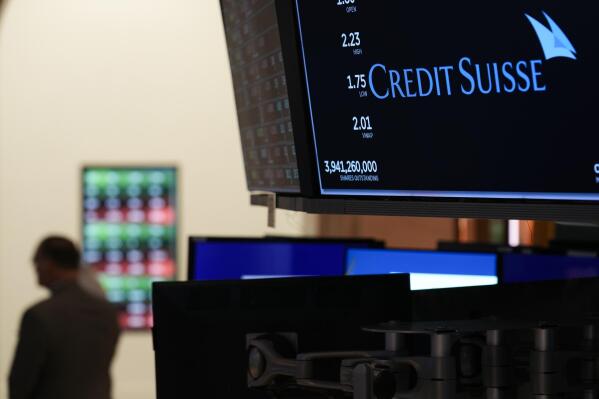Asian stocks fall after Wall St sinks on new bank fears
BEIJING (AP) — Asian stock markets tumbled Thursday after Wall Street sank as a plunge in Credit Suisse shares reignited worries about a possible bank crisis following the failure of two U.S. lenders.
Shanghai, Tokyo, Hong Kong and Sydney all dropped, reversing Wednesday’s gains. Oil prices edged higher.
Wall Street’s benchmark S&P 500 lost 0.7% on Wednesday after being down as much as 2.1% at one point following a 30% plunge in Credit Suisse’s share price. That fueled jitters about the strength of global banks that are under strain from interest rate hikes to cool inflation.
The Credit Suisse fall “shakes already fragile investor sentiment,” said Venkateswaran Lavanya of Mizuho Bank in a report.
Major banks in Asia were hit by heavy selling. Shares in Japan’s Mizuho Bank were down 3.9& while Resona Holdings, Japan’s No. 5 bank, fell 4.8%. In Hong Kong, Standard Chartered Plc lost 2.5% and HSBC was 2.5% lower.
The Shanghai Composite Index lost 0.4% to 3,250.63 after government data Wednesday showed the Chinese economy is recovering more slowly than expected following the lifting of anti-virus controls.
The Nikkei 225 in Tokyo retreated 0.9% to 26,974.39 and the Hang Seng in Hong Kong shed 1.3% to 19,297.81.
The Kospi in Seoul was 0.2% lower at 2,375.12 and Sydney’s S&P-ASX 200 sank 1.5% to 6,964.80.
On Wall Street, the S&P 500 declined to 3,891.93. The Dow Jones Industrial Average lost 0.9% to 31,874.57 after being off more than 2% at one point. The Nasdaq composite recovered from a steep decline to close up 0.1% 11,434.05.
Markets recovered some of their losses Wednesday after Switzerland’s central bank said it could provide some assistance to Credit Suisse “if needed,” and the bank said it would exercise the option to borrow up to 50 billion Swiss francs ($53.7 billion).
Credit Suisse has been fighting troubles for years, including losses it took related to the 2021 collapse of investment firm Archegos Capital.
Its share price plunge reignited worries about finance industries after Silicon Valley Bank and Signature Bank collapsed in the second- and third-biggest U.S. bank failures in history.
On Wall Street, bank stocks plunged Monday, recovered Tuesday and tumbled again Wednesday.
First Republic Bank sank 21.4%, a day after soaring 27%. JPMorgan Chase slid 4.7%.
Banks are struggling after the Federal Reserves fastest series of rate hikes in decades caused prices of assets on their balance sheets to decline.
In his annual letter to investors, BlackRock CEO Larry Fink pointed to prior eras of rising rates that led to “spectacular financial flameouts,” such as the years’ long savings and loan crisis.
“We don’t know yet whether the consequences of easy money and regulatory changes will cascade throughout the U.S. regional banking sector (akin to the S&L Crisis) with more seizures and shutdowns coming,” he wrote.
Stress in the financial system could push the Fed to hold off on hiking rates at its meeting next week or at least refrain from the larger rate hike it had been potentially signaling. But inflation at 6% in February still is well above the Fed’s 2% target.
Weaker-than-expected economic reports released Wednesday may have allayed some of those worries.
One showed that inflation at the wholesale level slowed by much more last month than economists expected. It’s still high at a 4.6% level versus a year earlier, but that was better than the 5.4% that was forecast.
Other data showed that U.S. spending at retailers fell by more than expected last month. Such data could raise worries about a recession on the horizon, but they may also take some pressure off inflation in the near term.
The yield on the two-year Treasury bond, or the difference between its market price and the payout at maturity, narrowed by an unusually wide margin to 3.89% from Tuesday’s 4.25% as prices rose.
In energy markets, benchmark U.S. crude gained 39 cents to $68.00 per barrel in electronic trading on the New York Mercantile Exchange. The contract plummeted $3.72 on Wednesday to $67.61. Brent crude, the price basis for international oil trading advanced 46 cents to $74.15 per barrel in London. It lost $3.76 to $73.69 the previous session.
The dollar declined to 132.76 yen from Wednesday’s 133.46 yen. The euro gained to $1.0596 from $1.0586.






